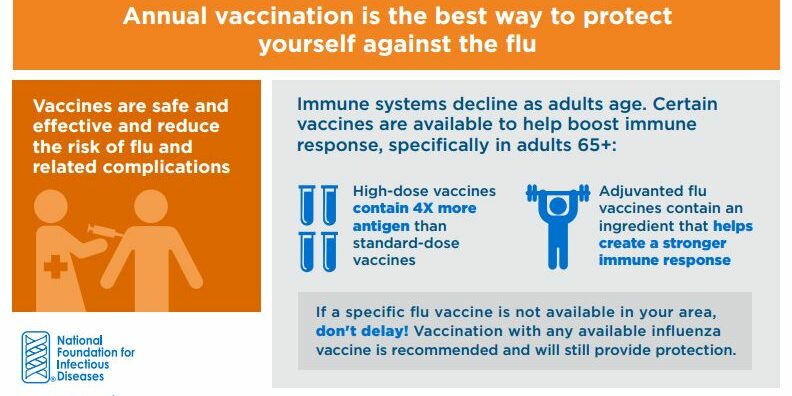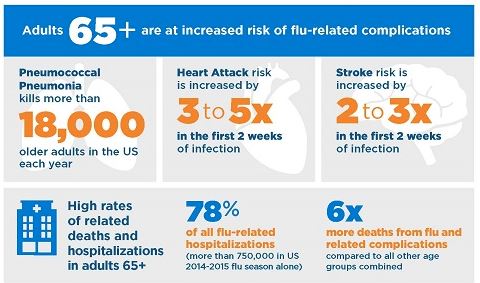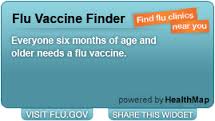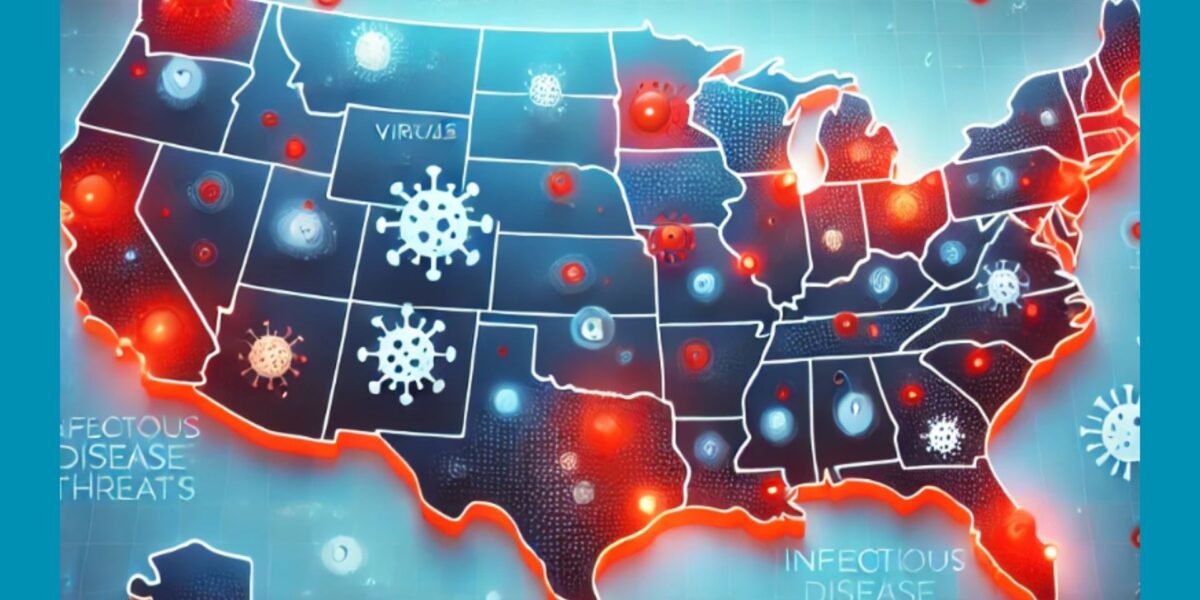
Influenza, more commonly referred to as flu, is a highly contagious viral infection of the nose, throat, and lungs that occurs most often in the late fall, winter, and early spring. It is a serious infection that affects between 5-20% of the US population annually.
The Centers for Disease Control and Prevention (CDC) recommends that everyone six months and older get an annual flu vaccine. However, despite the well-publicized risks that flu poses for older adults, US influenza vaccination coverage has stalled in adults age 65 years and older over the last few seasons, and even dropped from 66.8% in the 2014-2015 season to 63.4% in the 2015-2016 season.
In the US, adults age 65 years and older are disproportionately impacte d by influenza (flu) every year. There are far more flu-related deaths and hospitalizations in adults age 65 years and older than any other age group. Months after recovering from flu symptoms, older adults may still be at an increased risk of a heart attack, stroke, or other cardiovascular problems. Additionally, even when all of these risks have passed, older adults may be left facing the reality that they will never fully regain their pre-influenza health and abilities, significantly impacting their lifestyle.
d by influenza (flu) every year. There are far more flu-related deaths and hospitalizations in adults age 65 years and older than any other age group. Months after recovering from flu symptoms, older adults may still be at an increased risk of a heart attack, stroke, or other cardiovascular problems. Additionally, even when all of these risks have passed, older adults may be left facing the reality that they will never fully regain their pre-influenza health and abilities, significantly impacting their lifestyle.
Below are answers to frequently asked questions about influenza vaccination for older adults:
When should I get a flu vaccine?
You should get an annual influenza vaccine as soon as it is available in your area. However, as long as flu viruses are circulating, vaccination should continue throughout the flu season.
Which flu vaccine is best for me?
If you are age 65 years or older, you may want to consider one of the flu vaccines specifically designed for the 65+ population, but getting any influenza vaccine is better than not getting vaccinated at all.
Does the flu vaccine work?
Yes, influenza vaccines work! How well they work can vary each year because different influenza viruses circulate each year. Also, vaccines may not prevent infection completely as we age, but getting vaccinated can make the flu less severe if you do get it and also lower your risk of hospitalization, heart attack, and death, among other serious complications.
 I want the special vaccine for adults age 65+ but I’m having trouble finding it. What should I do?
I want the special vaccine for adults age 65+ but I’m having trouble finding it. What should I do?
You can check vaccine.healthmap.org to see which vaccines are available in your area, or you can call local pharmacies or senior centers. But do not delay in getting whichever vaccine is available—it takes about two weeks for the influenza vaccine to become effective once administered. A vaccination deferred is often a vaccine not received.
I’m allergic to eggs. Can I still get a flu vaccine?
If you only get hives after exposure to eggs then you can get any influenza vaccine. If you have had a more serious reaction, such as swollen lips and lightheadedness, or have trouble breathing and need emergency medical care, you should still get vaccinated, but either in a location where a healthcare professional can monitor you for an allergic reaction after you have been vaccinated or with a special vaccine that is made with no egg allergens.
I’ve never had the flu so why do I need to get a vaccine?
There is no way to tell who will get the flu each year or how severe the illness will be. Even if you feel perfectly healthy, you are at higher risk of serious outcomes from the flu as you get older, including being hospitalized or having a heart attack or stroke.
Can’t the vaccine give me the flu?
The influenza vaccine cannot give you the flu. People sometimes get sick shortly after they get vaccinated and they assume there is a connection. This is not from an influenza infection, but could be just part of how they feel as their body develops immunity. Also, during the fall and winter respiratory virus seasons, people tend to get sick more often. There is a chance that it happens close to when you got vaccinated, but that does not mean it was caused by vaccination.
What is the difference between influenza vaccines specifically approved for adults 65+ and standard influenza vaccines?
As people age, their immune system may not respond as well, decreasing the body’s ability to respond to vaccination. Influenza vaccines for those 65+ are designed to help improve the response of the immune system to vaccination and increase the chances of being protected against the flu.
How do I know that the vaccines are safe?
Like all vaccines approved by the US Food and Drug Administration (FDA), all licensed influenza vaccines have undergone extensive testing and research.
For additional information, visit www.nfid.org/flu and read the Call to Action: Reinvigorating Influenza Prevention in US Adults Age 65 Years and Older.
To join the conversation, follow NFID (@nfidvaccines) on Twitter using the hashtag #FightFlu, like NFID on Facebook, join the NFID Linkedin Group, and subscribe to NFID Updates.
Related Posts

News Round-Up: Infectious Disease Threats
According to NFID website poll, there are several worrisome infectious disease threats. Read recent news on topics of greatest concern, including avian influenza (bird flu), measles, and respiratory syncytial virus (RSV) …

Vaccines and Heart Health: A Vital Connection
Heart disease can increase the risk of serious or fatal complications from respiratory diseases including COVID-19, flu, and RSV

Harnessing the Power of Local Data
NFID dashboard aims to empower stakeholders with hyperlocal data to increase US adult respiratory vaccine uptake
